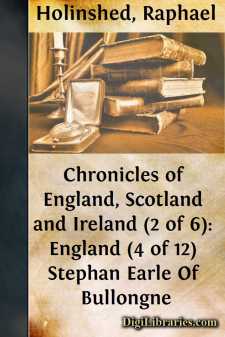History
- Africa 30
- Americas (North Central South West Indies) 50
- Ancient 68
- Asia 58
- Australia & New Zealand 8
- Canada 41
- Caribbean & West Indies 1
- Civilization 20
- Eastern Europe 12
- Europe
- Expeditions & Discoveries 60
- General 77
- Historical Geography 1
- Jewish 9
- Latin America 3
- Medieval 8
- Middle East 14
- Military 248
- Revolutionary 8
- Study & Teaching 5
- United States 353
- Western Europe 56
- World 13
Europe Books
Sort by:
by:
Anonymous
Prior. Mr. Dean, I am sorry to see you up, if any of your private Affairs disturb you. I came to call at your Grave, and have a little Discourse with you; but unless 'tis the Publick has rouz'd you, I am troubled to find you walking as well as my self. Swift. 'Tis my Country keeps me walking! why who can lie still? I don't believe there are many Ghosts now, that have any share of...
more...
by:
Henry Goudemetz
THE LAST WILL OF LOUIS XVI. IN the name of the most holy Trinity, Father, Son, and Holy Ghost, this day, the 25th of December, 1792, I, Louis XVI. by name, King of France, having been four months shut up with my family in the Tower of the Temple, at Paris, by those who were my subjects, and deprived of all communication whatever, even, since the 11th of this month, with my family; being moreover...
more...
CHAPTER I COMMUNISTIC FARMING.—GROWTH OF THE MANOR.—EARLY PRICES.—THE ORGANIZATION AND AGRICULTURE OF THE MANOR When the early bands of English invaders came over to take Britain from its Celtic owners, it is almost certain that the soil was held by groups and not by individuals, and as this was the practice of the conquerors also they readily fell in with the system they found. These English,...
more...
The present work is intended for such students as have already an elementary knowledge of the main facts of English history, and aims at meeting their needs by the use of plain language on the one hand, and by the avoidance, on the other hand, of that multiplicity of details which is apt to overburden the memory. At the close of the book I have treated the last eleven years, 1874 to 1885, in a manner...
more...
by:
Thomas Carlyle
CHAPTER I. — CHILDHOOD: DOUBLE EDUCATIONAL ELEMENT. Of Friedrich's childhood, there is not, after all our reading, much that it would interest the English public to hear tell of. Perhaps not much of knowable that deserves anywhere to be known. Books on it, expressly handling it, and Books on Friedrich Wilhelm's Court and History, of which it is always a main element, are not wanting: but...
more...
STEPHAN EARLE OF BULLONGNE. 1135.An. Reg. 1. Stephan earle of Bullongne, the sonne of Stephan erle of Blois, by his wife Adela, daughter to William Conquerour, came ouer with all speed after the death of his vncle, and tooke vpon him the gouernement of the realme of England, partlie through confidence which he had in the puissance and strength of his brother Theobald earle of Blois, and partlie by...
more...
by:
John Davenport
ESSAY I. REMARKS UPON THE SYMBOLS OF THEREPRODUCTIVE POWERS. ROM the investigations and researches of the learned, there appears to be no doubt but that the most ancient of all superstitions was that in which Nature was contemplated chiefly under the attribute or property of fecundity; the symbols of the reproductive power being those under which its prolific potencies were exhibited. It is not because...
more...
by:
Charles Morris
HERMANN, THE HERO OF GERMANY. In the days of Augustus, the emperor of Rome in its golden age of prosperity, an earnest effort was made to subdue and civilize barbarian Germany. Drusus, the step-son of the emperor, led the first army of invasion into this forest-clad land of the north, penetrating deeply into the country and building numerous forts to guard his conquests. His last invasion took him as...
more...
by:
Edward Farr
WAR WITH SPAIN. The year had not closed before the ministers found that a rupture with Spain was inevitable. The first intimation of it was detected in the menacing conduct of the court of Versailles; and Lord Bristol, the English ambassador at Madrid, was instructed to demand the real intentions of Charles III., and the real purport of the family compact. General Wall, the Spanish minister replied...
more...











